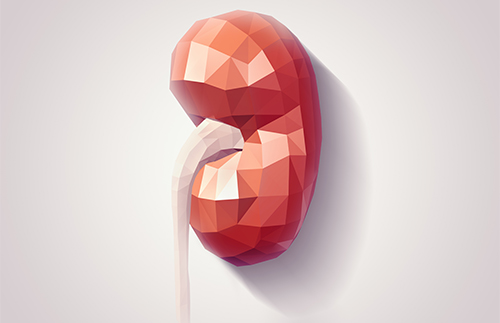In a new paper, scientists have reported the first successful human transplant of a kidney converted from blood type A to the universal type O using special enzymes developed at the University of British Columbia. These enzymes are designed to help prevent a mismatch and rejection of the organ. Details of the work, which was led by scientists from the University of British Columbia, are published in Nature Biomedical Engineering in a paper titled “Enzyme-converted O kidneys allow ABO-incompatible transplantation without hyperacute rejection in a human decedent model.”
According to the scientists, an enzyme-converted kidney was transplanted into a brain-dead recipient with consent from the family. They then observed the body’s immune response to the new organ. They report that for two days post-transplant, the kidney functioned without signs of hyperacute rejection. By the third day, they observed that some blood-type markers reappeared and triggered a mild reaction. However the damage was less severe than would typically be seen in cases when an organ was mismatched. They also observed signs that the body was beginning to tolerate the new organ.
The breakthrough is the result of more than a decade of work on enzyme development that began in the early 2010s in the laboratory of Stephen Withers, PhD, UBC professor emeritus of chemistry. He and a colleague, Jayachandran Kizhakkedathu, PhD, a professor in the department of pathology and laboratory medicine at UBC, were interested in making universal donor blood by stripping away the sugars that define blood types. If successful, their research could, for example, help type O patients who make up more than half of kidney waitlists. Type O kidneys are universally compatible with other blood types, yet patients with this blood type can only receive type O organs, leading to longer wait times for these patients.
Unlike traditional methods for addressing blood-type incompatibility in transplants which require days of intensive treatments to suppress the recipient’s immune system, this new approach changes the organ itself. In the future, it could mean performing transplants faster with few complications and enabling the use of blood-type mismatched organs from deceased donors.
In 2019, the scientists discovered two enzymes that remove the sugar that defines type A blood, effectively converting it to type O. The UBC enzymes act as molecular scissors, snipping off the ‘nametag’ that marks type A and revealing type O beneath. “It’s like removing the red paint from a car and uncovering the neutral primer,” Withers explained. “Once that’s done, the immune system no longer sees the organ as foreign.”
In 2022, scientists showed that lungs could be converted using the enzymes. They also successfully tested the enzymes in blood, lungs, and kidneys outside the body. Then in 2023, a team tested an enzyme-converted organ in the human body for the first time. “Our collaborators showed me their data where, using our enzymes, they had converted a human kidney and transplanted it into a brain-dead recipient. It was working beautifully,” Kizhakkedathu said.
Commenting on the findings from that test which are reported in Nature Biomedical Engineering, Withers noted that the results from this first-in-human trial “gives us invaluable insight into how to improve long-term outcomes.” The next steps are to seek regulatory approval for clinical trials. Additionally, a UBS spin-off, Avivo Biomedical, will take the lead on developing the enzymes for transplant application as well as to create universal donor blood on demand for use in transfusions.

